Iran Smuggles Drones To Russia By Boat, Airliners: Guardian
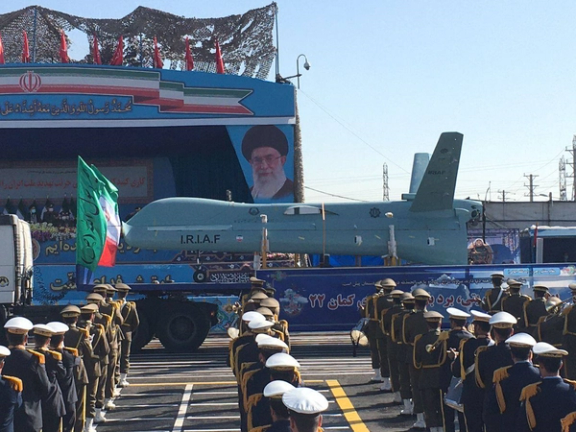
Iran used boats and a state-owned airline to smuggle new types of advanced long-range armed drones to Russia for use in its war on Ukraine, sources in Tehran told the Guardian.

Iran used boats and a state-owned airline to smuggle new types of advanced long-range armed drones to Russia for use in its war on Ukraine, sources in Tehran told the Guardian.
The report saysIran delivered at least 18 of the drones to the Russian navy after officers and technicians made a special visit to Tehran in November.
“On that occasion, the 10-man Russian delegation selected six Mohajer-6 drones, which have a range of around 200km and carry two missiles under each wing, along with 12 Shahed 191 and 129 drones, which also have an air-to-ground strike capability,” added the Guardian.
Unlike Shahed 131 and 136 drones, which have been broadly used by Moscow in kamikaze attacks against Ukrainian infrastructure, the higher-flying drones are able to deliver bombs and return to base.
The disclosures show that the two countries sharing hostility towards Washington are getting closer.
Iran’s Islamic government has supplied hundreds of drones to Russia since mid-2022 that have been used during missile attacks to swarm Ukrainian air defenses.
Increasingly short of missiles to sustain its brutal bombing campaign of Ukraine’s towns and cities, Russia has turned to Iran and also North Korea to replenish its stocks.
The United States and Europe have imposed new sanctions on Tehran for its expanded military ties with Moscow and its deadly crackdown on protests since last September.
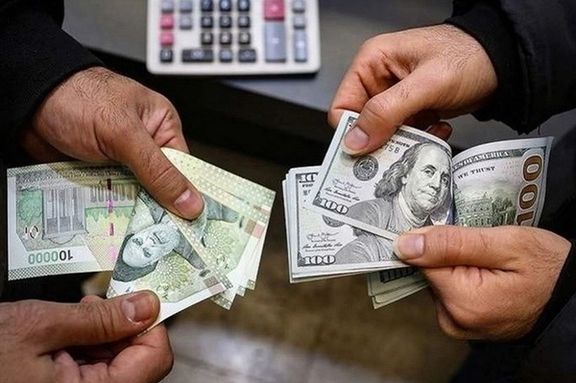
Iran’s currency hit another historic low on Sunday as the central bank reported record borrowing by government-owned companies and a burgeoning money supply.
The rial, which was trading at about 300,000 to the US dollar in late August fell to 460,000 on Sunday; a more than 50-perccent decline.
Us sanctions economic sanctions imposed since 2018 have gradually eroded Iran’s hard currency revenues, depleted its foreign currency reserves and have led to economic uncertainty.
Lack of a new nuclear deal with the United States has also led to more pessimism since September, when the latest attempt by the European Union to broker a deal fell apart.
In addition to these negative factors, popular protests in the past five months have led to political uncertainty and more capital flight from the country.
The rial’s fall leads to more inflation for essential commodities such as foodstuff and animal feed, impoverishing a population hit hard by 40-50 percent annual inflation in the past three years.
Food prices have been rising much faster, with official figures indicating between 70-100 percent annual inflation for basic food items such as meet and dairy. Consumption of some items have decreased by more than 50 percent in the past two years.
At the same time rents and home prices have climbed as much as the value of the US dollar has risen, reaching a level that an ordinary worker must hold two or even three jobs just to afford basic housing. Workers make between $100-150 a month, calculated by the current rate of the dollar.
Some observers say that rising prices can lead to more widespread and sustained protests against the regime. The current government, mostly staffed by hardliners, is seen as inefficient and unable to govern in an environment of multiple challenges. Even many conservatives and loyalists have begun to criticize President Ebrahim Raisi and his ministers.
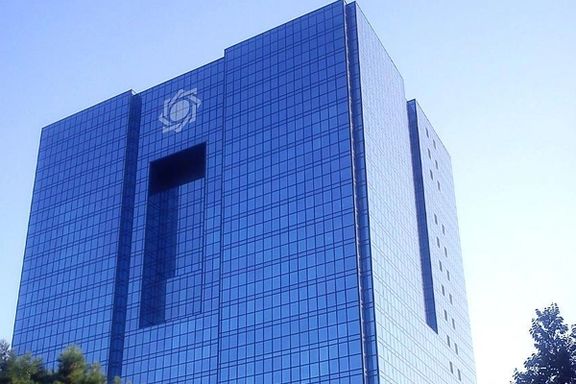
Meanwhile, new figures published Sunday by the Central Bank of Iran (CBI) showed that borrowing by government-owned companies increased by 77.5 percent in the first eight months of the Iranian calendar year, from March 21- November 20.
These largely unprofitable and money-losing enterprises borrow from government banks, which in turn borrow from the central bank. These banks in turn had to borrow 59 percent more from the CBI during November 2021-November 2022,
The central bank in turn resorts to printing money, without sufficient economic growth or foreign currency revenues. This means that the money supply increases fast, leading to more currency devaluation and inflation.
One major reason why government companies have increased borrowing is that the government takes money from these essentially bankrupt enterprises to finance its own 50-percent budget deficit.
The Raisi government has been claiming that it has stopped borrowing from the CBI, but in fact it has shifted to cashing money from its economic enterprises, which have assumed the role of borrowers. In short, the cycle of government borrowing, and money printing has become more complicated by the intermediary role public companies play as some sort of facilitators.
The money supply reached 58,000 trillion rials by November, or $200 billion based on the average rate of exchange during the first eight months of the Iranian calendar year.
The situation is heading toward a serious crisis. A centrist politician said this week that “Iran is on fire.”

Iran’s judiciary says 20 people involved in the robbery of safety deposit boxes at a central branch of Bank Melli (National Bank) in Tehran have been released on bail.
Judiciary Spokesman Masoud Setayeshi claimed Sunday that so far, 26 people have been arrested in the case who are accused of acquiring stolen property and money laundering.
In June 2022, thieves broke into at least 200 safety deposit boxes in a central Tehran branch of Iran’s largest bank. Apparently, the robbers gained access from an adjacent building during the holiday.
The case made national headlines, but the indicted individuals have been freed on bail while four protesters were tried and hanged in December after sham trials in a matter of a few weeks after their arrest. Thousands of other protesters have been beaten and tortured in prisons and more than a dozen have received the death penalty.
State media revealed that the bank’s alarm was not connected to the police and had only sent a text message to the branch manager, who ignored it as the system had been prone to false alerts.
Four days later police displayed recovered money and gold after they announced the arrest of 13 people allegedly involved in the large bank heist in Tehran.
The surprisingly quick reaction and arrests by the police raised eyebrows with many seeing it as an ‘inside job’.
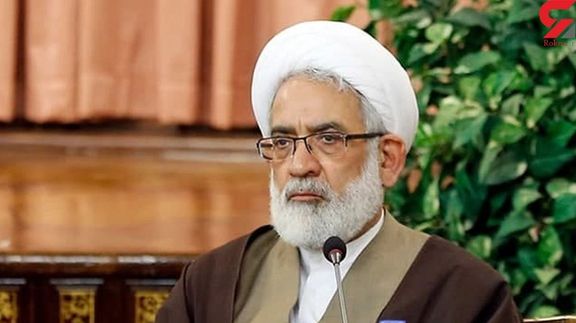
Iran’s Attorney General says the people who created fake deaths and caused damages during the protests will not be pardoned and must be held accountable.
Referring to Supreme Leader Ali Khamenei’s amnesty for some prisoners arrested during antigovernment protests in recent months, Mohammad Jafar Montazeri claimed it was a “clemency” by the Supreme Leader.
When the crime of every person is proven, he will be indicted and must be punished, he said during a three-day visit to Esfahan province.
“The right of amnesty has been given to the Leader in the Constitution, which is carried out at the request of Chief Justice. If the leader thinks it is necessary, he might pardon the condemned people,” added Montazeri.
Government media reported February 5 that Khamenei “agreed” with a proposal by the country’s Judiciary to take what appears to be a political move to show clemency after hundreds were killed and around 19,000 arrested.
It is not clear from the announcement how many or which prisoners will be pardoned and whose sentences will be reduced. While thousands of young and teenage protesters were arrested in street demonstrations, hundreds of political activists, journalists and writers and artists have also been detained.
Khamenei's move came at the 44th anniversary of the Islamic Republic, as a move to rescue the image of the regime amid a grim economic crisis and mass public rejection of the political system he presides over.
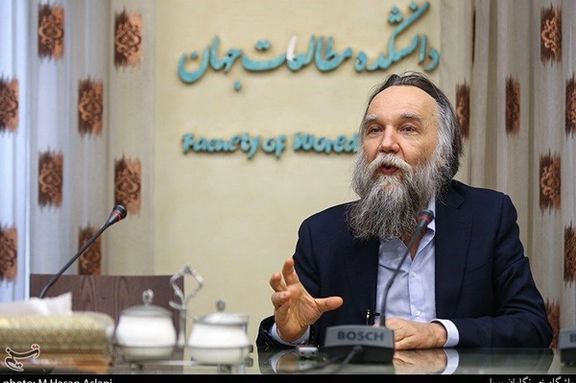
Alexander Dugin, the Russian ultra-nationalist philosopher, has participated in a ceremony commemorating the 44th anniversary of the establishment of the Islamic regime in Moscow.
Dugin, known as Putin's brain, is a philosopher and extremist nationalist who advocates the creation of a new Russian empire and is also a supporter of the military attack on Ukraine.
Some analysts believe that the 60-year-old theorist has a lot of influence on Russian President Vladimir Putin.
In recent years, Dugin has been invited to visit Iran regularly, usually by hardliners and entities associated with the Revolutionary Guard.
During a visit to the religious city of Qom in 2015, Dugin referred to modernity as “Satan”, the West as “the hereditary house of Satan,” and Iran as “the main base of war against modernity.”
Dugin believes that Ayatollah Khamenei is the “best solution” for confronting the West. “If he helps to defeat the West I am sure we will emerge from this arena victorious and proud,” he said, because “in the center of the Guardianship of [the Islamic] Jurist, God’s will is at work.”
But while he wants Ali Khamenei’s help in defeating the West, Dugin concedes that he has not been successful in bringing Iran and Russia closer. “Young Iranians are not very interested in getting to know Russia. Perhaps we should search for a key to open this door between the two countries,” he said.
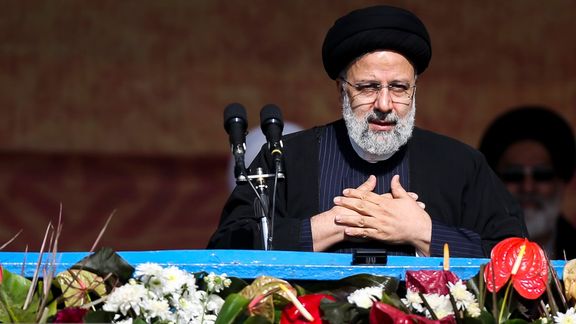
Finding itself under pressure, the Islamic Republic may be ready to make some concessions to protesters at home and to Western countries whose citizens are held hostage in Tehran.
Reports from Tehran say that French-Iranian dual national academic Fariba Adelkhah has been released from jail. Adelkhah was sentenced to five years in 2020 on national security charges that she denied. Reports say that there are still several other French nationals in jail in Iran who are in essence Iran's hostages.
For decades, the Islamic Republic has been arresting foreigners and dual nationals on vague and trumped-up charges, keeping them in prison until it can make a deal with Western countries either for money, diplomatic concessions or freeing its agents convicted abroad.
Speaking on the anniversary of the 1979 Islamic revolution Foreign Minister Hossein Amir-Abdollahian told an NPR correspondent that an agreement to swap dual national prisoners with the United States is on the table.
He said that releasing Iranian-American Siamak Namazi is pending some technical measures on the part of the United States. However, he did not elaborate on the nature of those measures.
Amir-Abdollahian also tried to sound optimistic on the nuclear issue, as Iran finds itself under more isolation and the pressure of sanctions. He said that there is still a window of opportunity for all sides to return to the JCPOA.
Meanwhile, the violation of human rights by the Iranian regime during recent protests, and Tehran's involvement in Moscow's war against Ukraine have made the situation more complicated, making it difficult for the United States and Europe to make a deal with Iran.
On the domestic front, while according to political activists only around 150 of the prisoners "pardoned" by Supreme Leader Ali Khamenei were actually released from jail until Friday, reports came in Saturday morning about more political prisoners being released from detention.
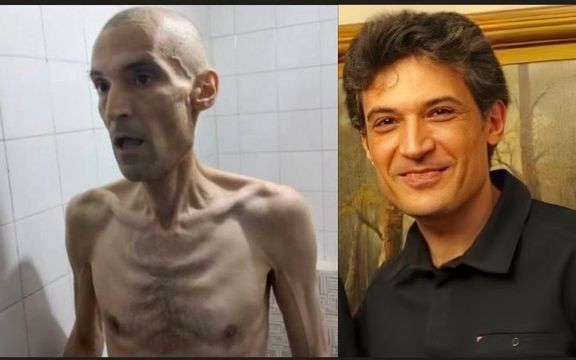
One of them was Farhad Meysami, whose heart-wrenching pictures were released last week following a long hunger strike. Meysami who was sentenced to five years in jail, was freed only four months before the end of his sentence.
While reports in Tehran indicated that President Ebrahim Raisi was going to make a “very important” announcement in his revolution anniversary speech on Saturday, his remarks contained nothing other than the usual unfounded claims about the Islamic Republic being the top power in the region, having achieved great success in many areas.
After the speech however, Iranian media sources quoted Raisi as having said that all students, cultural and athletic figures and media activists in jail are also going to be pardoned. Raisi tried to portray the amnesty as a measure championed by his government rather than the Iranian Judiciary Chief, Gholam-Hossein Mohseni Ejei, who had called for a partial amnesty.
More than 90 Iranian journalists and a dozen athletes are said to have been detained during the protests since September, and many have already been released.
It is still not clear how many of the "tens of thousands" of prisoners who were to be freed based on Ejei's request are still remaining in jail and how many have been released.
Raisi’s promise to release more detainees was also vague. He did not mention how many prisoners would be included in the amnesty. However, he said the "fatherly amnesty" is a measure to confront the enemies who sow discord in Iran.
He also promised that the government is planning to facilitate the return of Iranians living abroad including those who have possibly acted against the law, but declined to elaborate. He only said that people will be notified of the measures "soon".